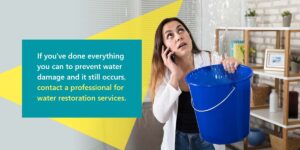If left unchecked, water damage can quickly become an expensive repair and cleanup process. While there are ways you can prevent water damage in winter, it can still happen despite your best efforts.
Learn about the most common causes of water damage that occurs in winter, how you can prevent it from happening and what to do if your home experiences water damage.
5 Common Types of Water Damage in Winter
Understanding how water damage happens can help prevent significant damage to your home. Below are the most common types of water damage in winter.
1. Frozen or Burst Pipes
Frozen pipes are one of the most common causes of water damage in the winter. As the water in a pipe freezes, it can expand, increasing the likelihood that the pipe will rupture from the pressure. Even the sturdiest pipes can break from the pressure, causing water to flood the area and cause damage.
Pipes that are more prone to bursting are ones along exterior walls and those in unheated home areas, such as the attic, crawl spaces, basement and underneath a kitchen sink.
2. Melting Snow
Another cause of water damage is melting snow. Sometimes, your gutters can become blocked or freeze, which can cause significant damage to your home.
If ice is clogging your gutters, melting snow from the roof can't pass through the draining system, causing water to spill over from all directions. Trapped water can also freeze in the gutters, creating ice dams. When these melt, the water can damage your roof and seep into the attic, allowing mold to grow and causing structural damage.
Ice dams also have a lot of weight, which can stress your roof and lead to water leaks. You can tell whether you have a leak coming from your roof if your ceiling has watermarks or if you have water leaks inside your home. Melting snow can also create runoff water that can flood your basement, especially if the ground slopes toward your basement.
3. Condensation
Water is naturally attracted to cold surfaces, including window panes and water pipes. Condensation becomes more common in winter because the cold air can't hold much water. A humid home can create excessive condensation, allowing it to drip onto various surfaces, including drywall, carpet, wood floors and other areas susceptible to water damage.
4. Leaking Water Heaters
When incoming water temperatures drop in the winter, your water heater puts in significantly more work than normal. Older water heaters are more vulnerable to leaks, which can flood your home if you don't catch them in time. Damaged water heaters can also create significant water damage in your home if they spring a leak.
5. Outdoor Water Lines
Pipes inside the home can cause water damage, but so can outdoor water lines. You may have a hose outside your home or pipes carrying running water. Like the pipes inside your home, these water lines can freeze and potentially burst, causing excessive moisture to flood your home and cause issues.
5. Miscellaneous Water Sources
Sometimes, water damage isn't caused by frozen pipes, melted snow, condensation or other typical sources. Water damage can also occur from miscellaneous water sources, including hoses and water valves. These sources can freeze and burst due to the water's expansion from the cold. Depending on where these sources are located in relation to your home, they could seep into your home's foundation and cause significant structural damage.
How to Prevent Water Damage This Winter
Now that you understand how water damage happens, you can learn how to prevent it. Below are tips to help you protect your home from unnecessary damage:
- Prevent frozen pipes: Ensure your indoor pipes are insulated properly. On freezing nights, let the water drip from your sink faucets to allow a continuous water flow, reducing pressure. You should also avoid setting the thermostat lower than 55 degrees Fahrenheit. If you go out of town, turn off your water supply to prevent returning to a flooded home.
- Clean your gutters: You can prevent ice dams and overflowing water by cleaning your gutters. You can also extend your downspouts by 6 feet or more to help drain water correctly. Additionally, ventilate your attic and seal and insulate the attic floor to keep warm indoor air where it belongs.
- Shovel snow away from your home: Melted snow can infiltrate your basement, causing flooding and water damage. Avoid this issue by shoveling snow away from your home and adding soil around the area to guide melted snow runoff away from your house's foundation.
- Adjust humidifier settings: You can prevent condensation by adjusting your humidifier's settings. When your home has a less humid environment, it reduces the risk of condensation building up on your windows or water pipes.
- Take care of your water heater: An old or damaged water heater can spring a leak, causing water damage in your home. Flush your water heater at least once a year, replace your water heater if it's more than 10 years old and schedule any necessary maintenance or repairs as you need them.
- Manage outdoor water lines: Outdoor water lines, such as hoses and outdoor pipes, can freeze and burst like indoor water pipes. You should cut off any hoses' water supply and allow trapped water to drain. Turn off valves to outdoor water sources when you expect freezing temperatures.

What to Do if You Experience Water Damage
If you've done everything you can to prevent water damage and it still occurs, contact a professional for water restoration services.
Water restoration experts have advanced equipment to determine the extent of your water damage. They can drain the excess water from your home much sooner than a standard humidifier, helping control the damage and restore your home.
If you experience water damage, follow these steps to handle the matter professionally:
- Shut off the electricity in the surrounding area to prevent water from coming into contact with live wires, outlets or plugs.
- Find the leak's location and shut off your water to prevent additional damage.
- Try to contain the water still leaking with buckets or waterproof containers.
- Contact your insurance company to let them know about the water damage and take photos to help when you file a claim.
- Call a professional to help with water restoration, helping minimize damage and allowing you to return your home to normal as soon as possible.
Following these steps can help you streamline water damage restoration efforts and help reduce the risk of unnecessary damage to your home.
Trust ServiceMaster of Lincoln Park as Your Water Damage Restoration Experts
ServiceMaster of Lincoln Park is here to help if you need water damage restoration in winter. Our services are available 24/7, ensuring you can prevent additional damage as soon as possible.
With our water damage restoration services, you can rest easy knowing we can help return your home to its previous condition before the water damage happened. We offer a full range of services to handle your unique circumstances, allowing us to tackle projects of any scope or size.
Contact us today to learn more about how we can help you with water damage in winter!



